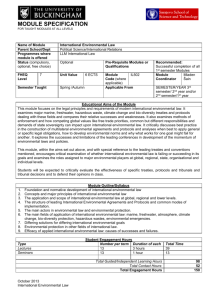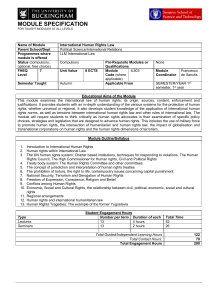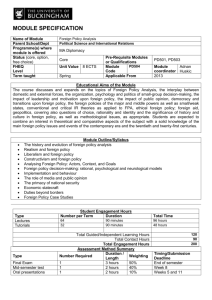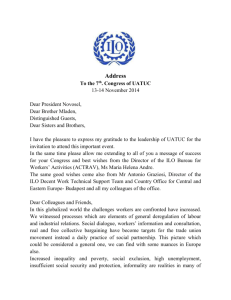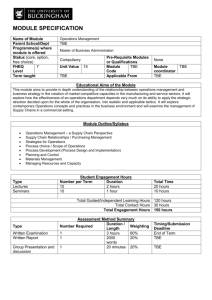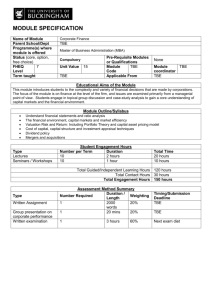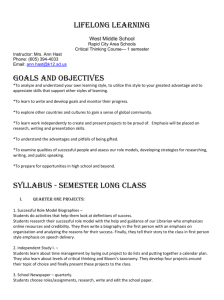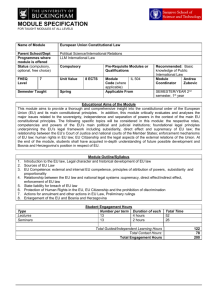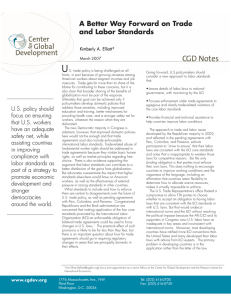Thesis Research and Methodology
advertisement
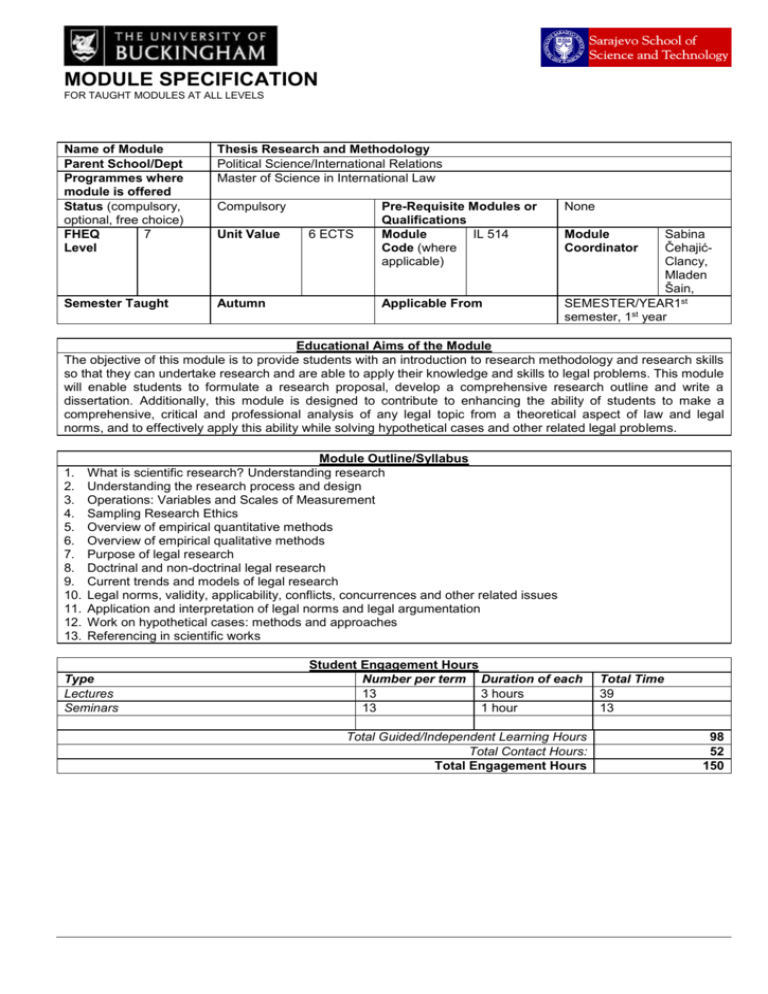
MODULE SPECIFICATION FOR TAUGHT MODULES AT ALL LEVELS Name of Module Parent School/Dept Programmes where module is offered Status (compulsory, optional, free choice) FHEQ 7 Level Thesis Research and Methodology Political Science/International Relations Master of Science in International Law Semester Taught Autumn Compulsory Unit Value 6 ECTS Pre-Requisite Modules or Qualifications Module IL 514 Code (where applicable) Applicable From None Module Coordinator Sabina ČehajićClancy, Mladen Šain, SEMESTER/YEAR1st semester, 1st year Educational Aims of the Module The objective of this module is to provide students with an introduction to research methodology and research skills so that they can undertake research and are able to apply their knowledge and skills to legal problems. This module will enable students to formulate a research proposal, develop a comprehensive research outline and write a dissertation. Additionally, this module is designed to contribute to enhancing the ability of students to make a comprehensive, critical and professional analysis of any legal topic from a theoretical aspect of law and legal norms, and to effectively apply this ability while solving hypothetical cases and other related legal problems. 1. 2. 3. 4. 5. 6. 7. 8. 9. 10. 11. 12. 13. Module Outline/Syllabus What is scientific research? Understanding research Understanding the research process and design Operations: Variables and Scales of Measurement Sampling Research Ethics Overview of empirical quantitative methods Overview of empirical qualitative methods Purpose of legal research Doctrinal and non-doctrinal legal research Current trends and models of legal research Legal norms, validity, applicability, conflicts, concurrences and other related issues Application and interpretation of legal norms and legal argumentation Work on hypothetical cases: methods and approaches Referencing in scientific works Type Lectures Seminars Student Engagement Hours Number per term Duration of each 13 3 hours 13 1 hour Total Guided/Independent Learning Hours Total Contact Hours: Total Engagement Hours Total Time 39 13 98 52 150 Type Mid-semester test (unseen written test performed in class conceptual questions) Written assignment (research outline) Reflective Report Written Examination Assessment Method Summary Number required Duration Weighting 1 1 hour 10% Timing/ Submission Deadline Week 8 1 1500 words 15 % Week 10 1 1 2500 words 3 hours 25% 50% Week 12 End of semester Module Outcomes Intended Learning Outcomes: Teaching/Learning Strategy: 1. Understanding of the research process 2. Critical understanding of disadvantages and advantages of various research methods 3. Development of ability and knowledge on how to conduct research 4. A thorough comprehension of the notion and nature of legal norms, their validity, applicability, normative conflicts, concurrences, interpretation and application of legal norms 5. Understanding of the library and electronic resources. 1. Lectures provide the core information and seminars provide a forum for further discussions on the topic. (ILO: 1-5) 2. Student presentations (ILO: 1-2) 3. Individual consultancy provided by the course instructor (ILO:1,3) → Assessment Strategy: → Practical Skills: 1. Ability to develop a research proposal 2. Ability to conduct research 3. Enhanced ability to use specialised legal on-line research resources 1. Written final examination (ILO:1,2,4) 2. Written mid-semester examination: (ILO:1,2) 3. Assignments (writing a research outline and reflective report): (ILO: 1-5) Teaching/Learning Strategy: → 1. Lectures and seminars (PS: 1,3) 2. Assignments (PS: 1,2) 3. Guided preparation of a research outline (PS: 1-3) Assessment Strategy: → Transferable Skills: 1. 2. 3. 4. Analytical skills Clarity of oral and written presentation Time management skills Critical thinking skills 1. Assignments (writing a research outline and reflective report) (PS:1-3) 2. Written final exam and mid-semester exam (PS: 1,3) Teaching/Learning Strategy: → 1. Lectures and seminars (TS: 1,4) 2. Student presentation (PS: 1,2,3) 3. Assignments (e.g., conducting a review of published research paper) (PS: 1,4) Assessment Strategy: 1. Assignments (writing a research outline and reflective report) (TS: 1-4) 2. Written final exam (TS: 1-4) 3. Mid-semester exam (TS:1,3,4) → Key Texts and/or other learning materials Key texts: 1. Bell, J., 2005. Doing Your Research Project. Maidenhead: Open University Press. 2. Hanson, Sh., 2003. Legal Method and Reasoning. 2nd ed. London: Routledge 3. Clinch, P., 2002. Using a Law Library: a Student’s Guide to Legal Research Skills. 2nd ed. London: Blackstone. Other materials: 4. Blaxter, L., Hughes, Ch., Tight, M., 2010. How to Research. 4th ed. Maidenhead: Open University Press. 5. Hoffman M., 2008. International Legal Research in a Nutshell. St. Paul: West. 6. Creswell, J.W., 2008. Research Design: Qualitative, Quantitative and Mixed Method Approaches. 3rd ed. London: SAGE Publications Ltd. 7. Webley, L., 2005. Legal Writing. London: Cavendish 8. Beck, R.J., Arend, A.C. and Vander Lugt, R.D., 1996. International Rules: Approaches from International Law and International Relations. New York: Oxford University Press. 9. Vranes, E., 2006. The definition of „Norm Conflict“ in International Law and Legal Theory. European Journal of International Law, (e-journal) 17(2). Available at http://www.ejil.org/pdfs/17/2/80.pdf (Accessed 15 July 2013). Please note: This specification provides a concise summary of the main features of the module and the learning outcomes that a typical student might reasonably be expected to achieve and demonstrate if he/she takes full advantage of the learning opportunities that are provided. More detailed information on the learning outcomes, content and teaching, learning and assessment methods of each module and programme can be found in the departmental or programme handbook. The accuracy of the information contained in this document is reviewed annually by the University of Buckingham and may be checked by the Quality Assurance Agency. Date of Production: Date approved by School Learning and Teaching Committee Date approved by School Board of Study Date approved by University Learning and Teaching Committee Date of Annual Review:
